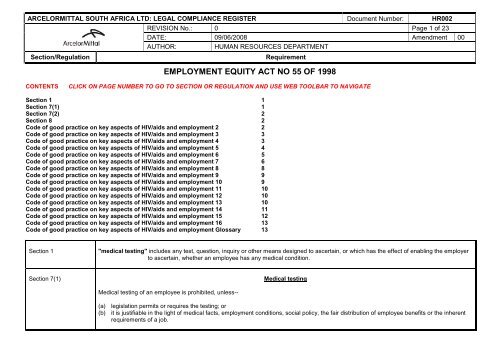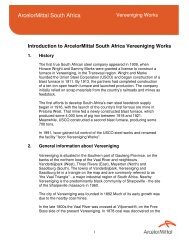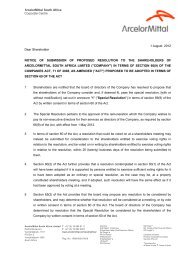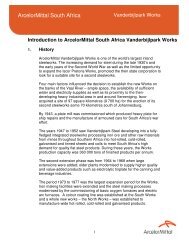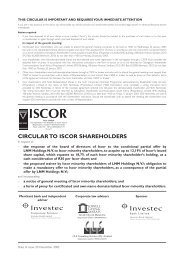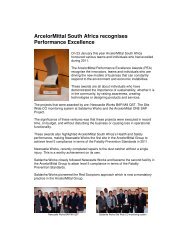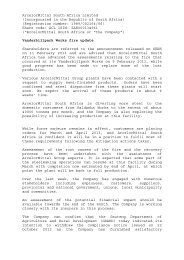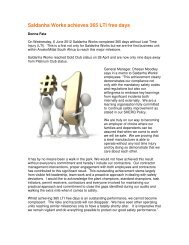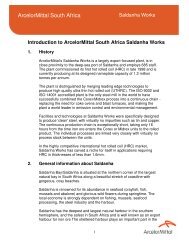legal compliance register - ArcelorMittal South Africa
legal compliance register - ArcelorMittal South Africa
legal compliance register - ArcelorMittal South Africa
Create successful ePaper yourself
Turn your PDF publications into a flip-book with our unique Google optimized e-Paper software.
ARCELORMITTAL SOUTH AFRICA LTD: LEGAL COMPLIANCE REGISTER Document Number: HR002<br />
Section/Regulation<br />
REVISION No.: 0 Page 1 of 23<br />
DATE: 09/06/2008 Amendment 00<br />
AUTHOR:<br />
HUMAN RESOURCES DEPARTMENT<br />
Requirement<br />
EMPLOYMENT EQUITY ACT NO 55 OF 1998<br />
CONTENTS<br />
CLICK ON PAGE NUMBER TO GO TO SECTION OR REGULATION AND USE WEB TOOLBAR TO NAVIGATE<br />
Section 1 1<br />
Section 7(1) 1<br />
Section 7(2) 2<br />
Section 8 2<br />
Code of good practice on key aspects of HIV/aids and employment 2 2<br />
Code of good practice on key aspects of HIV/aids and employment 3 3<br />
Code of good practice on key aspects of HIV/aids and employment 4 3<br />
Code of good practice on key aspects of HIV/aids and employment 5 4<br />
Code of good practice on key aspects of HIV/aids and employment 6 5<br />
Code of good practice on key aspects of HIV/aids and employment 7 6<br />
Code of good practice on key aspects of HIV/aids and employment 8 8<br />
Code of good practice on key aspects of HIV/aids and employment 9 9<br />
Code of good practice on key aspects of HIV/aids and employment 10 9<br />
Code of good practice on key aspects of HIV/aids and employment 11 10<br />
Code of good practice on key aspects of HIV/aids and employment 12 10<br />
Code of good practice on key aspects of HIV/aids and employment 13 10<br />
Code of good practice on key aspects of HIV/aids and employment 14 11<br />
Code of good practice on key aspects of HIV/aids and employment 15 12<br />
Code of good practice on key aspects of HIV/aids and employment 16 13<br />
Code of good practice on key aspects of HIV/aids and employment Glossary 13<br />
Section 1<br />
"medical testing" includes any test, question, inquiry or other means designed to ascertain, or which has the effect of enabling the employer<br />
to ascertain, whether an employee has any medical condition.<br />
Section 7(1)<br />
Medical testing<br />
Medical testing of an employee is prohibited, unless--<br />
(a) legislation permits or requires the testing; or<br />
(b) it is justifiable in the light of medical facts, employment conditions, social policy, the fair distribution of employee benefits or the inherent<br />
requirements of a job.
ARCELORMITTAL SOUTH AFRICA LTD: LEGAL COMPLIANCE REGISTER Document Number: HR002<br />
Section/Regulation<br />
REVISION No.: 0 Page 2 of 23<br />
DATE: 09/06/2008 Amendment 00<br />
AUTHOR:<br />
HUMAN RESOURCES DEPARTMENT<br />
Requirement<br />
Section 7(2)<br />
Testing of an employee to determine that employee's HIV status is prohibited unless such testing is determined to be justifiable by the Labour<br />
Court in terms of section 50(4) of this Act.<br />
Section 8<br />
Psychological testing and other similar assessments<br />
Psychological testing and other similar assessments of an employee are prohibited unless the test or assessment being used--<br />
(a) has been scientifically shown to be valid and reliable;<br />
(b) can be applied fairly to all employees; and<br />
(c) is not biased against any employee or group.<br />
Code of good practice<br />
on key aspects of<br />
HIV/aids and<br />
employment CN<br />
R129: in Government<br />
Gazette 2/815 of Dec<br />
2000<br />
OBJECTIVES<br />
2.1 The Code's primary objective is to set out guidelines for employers and trade unions to implement so as to ensure individuals with HIV<br />
infection are not unfairly discriminated against in the workplace. This includes provisions regarding:<br />
(i)<br />
(ii)<br />
(iii)<br />
(iv)<br />
(v)<br />
creating a non-discriminatory work environment;<br />
dealing with HIV testing, confidentiality and disclosure;<br />
providing equitable employee benefits;<br />
dealing with dismissals; and<br />
managing grievance procedures.<br />
2.2 The Code's secondary objective is to provide guidelines for employers, employees and trade unions on how to manage HIV/AIDS<br />
within the workplace. Since the HIV/AIDS epidemic impacts upon the workplace and individuals at a number of different levels, it<br />
requires a holistic response, which takes all of these factors into account. The Code therefore includes principles, which are dealt with<br />
in more detail under the statutes listed in item 5.1, on the following:<br />
(i)<br />
(ii)<br />
(iii)<br />
(iv)<br />
(v)<br />
creating a safe working environment for all employers and employees;<br />
developing procedures to manage occupational incidents and claims for compensation;<br />
introducing measures to prevent the spread of HIV;<br />
developing strategies to assess and reduce the impact of the epidemic upon the workplace; and<br />
supporting those individuals who are infected or affected by HIV/AIDS so that they may continue to work productively for as<br />
long as possible.
ARCELORMITTAL SOUTH AFRICA LTD: LEGAL COMPLIANCE REGISTER Document Number: HR002<br />
Section/Regulation<br />
REVISION No.: 0 Page 3 of 23<br />
DATE: 09/06/2008 Amendment 00<br />
AUTHOR:<br />
HUMAN RESOURCES DEPARTMENT<br />
Requirement<br />
2.3 In addition, the Code promotes the establishment of mechanisms to foster co- operation at the following levels :<br />
(i)<br />
(ii)<br />
between employers, employees and trade unions in the workplace; and<br />
between the workplace and other stakeholders at a sectoral, local, provincial and national level.<br />
Code of good practice<br />
on key aspects of<br />
HIV/aids and<br />
employment<br />
POLICY PRINCIPLES<br />
3.1 The promotion of equality and non-discrimination between individuals with HIV infection and those without and between HIV/AIDS and<br />
other comparable health/medical conditions.<br />
3.2 The creation of a supportive environment so that HIV infected employees are able to continue working under normal conditions in their<br />
current employment for as long as they are medically fit to do so.<br />
3.3 The protection of human rights and dignity of people living with HIV or AIDS is essential to the prevention and control of HIV/AIDS.<br />
3.4 HIV/AIDS impacts disproportionately on women and this should be taken into account in the development of workplace policies and<br />
programmes.<br />
3.5 Consultation, inclusivity and encouraging full participation of all stakeholders are key principles, which should underpin every<br />
HIV/AIDS policy and programme.<br />
Code of good practice<br />
on key aspects of<br />
HIV/aids and<br />
employment<br />
APPLICATION AND SCOPE<br />
4.1 All employers and employees, and their respective organisations are encouraged to use this Code to develop, implement and refine<br />
their HIV/AIDS policies and programmes to suit the needs of their workplaces.<br />
4.2 For the purposes of this code, the term "workplace" should be interpreted more broadly than the definition given in the Labour<br />
Relations Act, Act 66 of 1995, Section 213, to include the working environment of, amongst others, persons not necessarily in an<br />
employer-employee relationship, those working in the informal sector and the self-employed.<br />
4.3 This Code however does not impose any <strong>legal</strong> obligation in addition to those in the Employment Equity Act and Labour Relations Act,<br />
or in any other legislation referred to in the Code. Failure to observe it does not, by itself, render an employer liable in any<br />
proceedings, except where the Code refers to obligations set out in law.
ARCELORMITTAL SOUTH AFRICA LTD: LEGAL COMPLIANCE REGISTER Document Number: HR002<br />
Section/Regulation<br />
REVISION No.: 0 Page 4 of 23<br />
DATE: 09/06/2008 Amendment 00<br />
AUTHOR:<br />
HUMAN RESOURCES DEPARTMENT<br />
Requirement<br />
4.4 The Code should be read in conjunction with other codes of good practice that may be issued by the Minister of Labour.<br />
Code of good practice<br />
on key aspects of<br />
HIV/aids and<br />
employment<br />
LEGAL FRAMEWORK<br />
5.1 The Code should be read in conjunction with the Constitution of <strong>South</strong> <strong>Africa</strong> Act, No. 108 of 1996, and all relevant legislation which<br />
includes the following:<br />
(i) Employment Equity Act, No. 55 of 1998;<br />
(ii) Labour Relations Act, No. 66 of 1995;<br />
(iii) Occupational Health and Safety Act, No. 85 of 1993;<br />
(iv) Mine Health and Safety Act, No. 29 of 1996;<br />
(v) Compensation for Occupational Injuries and Diseases Act, No. 130 of 1993;<br />
(vi) Basic Conditions of Employment Act, No. 75 of 1997;<br />
(vii) Medical Schemes Act, No. 131 of 1998; and<br />
(viii) Promotion of Equality and Prevention of Unfair Discrimination Act, No. 4 of 2000.<br />
5.2 The contents of this code should be taken into account when developing, implementing or reviewing any workplace policies or<br />
programmes in terms of the statutes listed above.<br />
5.3 The following are selected, relevant sections contained in certain of the above mentioned legislation. These should be read in<br />
conjunction with other legislative provisions.<br />
5.3.1 The Code is issued in terms of Section 54(1)(a) of the Employment Equity Act, No 55 of 1998 and is based on the principle that<br />
no person may be unfairly discriminated against on the basis of their HIV status. In order to assist employers and employees to<br />
apply this principle consistently in the workplace, the Code makes reference to other pieces of legislation.<br />
5.3.2 Section 6(1) of the Employment Equity Act provides that no person may unfairly discriminate against an employee, or an<br />
applicant for employment, in any employment policy or practice, on the basis of his or her HIV status. In any <strong>legal</strong> proceedings<br />
in which it is alleged that any employer has discriminated unfairly, the employer must prove that any discrimination or<br />
differentiation was fair.<br />
5.3.3 No employee, or applicant for employment, may be required by their employer to undergo an HIV test in order to ascertain their<br />
HIV status. HIV testing by or on behalf of an employer may only take place where the Labour Court has declared such testing<br />
to be justifiable in accordance with Section 7(2) of the Employment Equity Act.
ARCELORMITTAL SOUTH AFRICA LTD: LEGAL COMPLIANCE REGISTER Document Number: HR002<br />
Section/Regulation<br />
REVISION No.: 0 Page 5 of 23<br />
DATE: 09/06/2008 Amendment 00<br />
AUTHOR:<br />
HUMAN RESOURCES DEPARTMENT<br />
Requirement<br />
5.3.4 In accordance with Section 187(1)(f) of the Labour Relations Act, No. 66 of 1995, an employee with HIV/AIDS may not be<br />
dismissed simply because he or she is HIV positive or has AIDS. However where there are valid reasons related to their<br />
capacity to continue working and fair procedures have been followed, their services may be terminated in accordance with<br />
Section 188(1)(a)(i).<br />
5.3.5 In terms of Section 8(1) of the Occupational Health and Safety Act, No. 85 of 1993; an employer is obliged to provide, as far as<br />
is reasonably practicable, a safe workplace. This may include ensuring that the risk of occupational exposure to HIV is<br />
minimised.<br />
5.3.6 Section 2(1) and Section 5(1) of the Mine Health and Safety Act, No. 29 of 1996 provides that an employer is required to<br />
create, as far as is reasonably practicable, a safe workplace. This may include ensuring that the risk of occupational exposure<br />
to HIV is minimised.<br />
5.3.7 An employee who is infected with HIV as a result of an occupational exposure to infected blood or bodily fluids, may apply for<br />
benefits in terms of Section 22(1) of the Compensation for Occupational Injuries and Diseases Act, No. 130 of 1993.<br />
5.3.8 In accordance with the Basic Conditions of Employment Act, No. 75 of 1997 every employer is obliged to ensure that all<br />
employees receive certain basic standards of employment, including a minimum number of days sick leave [Section 22(2)].<br />
5.3.9 In accordance with section 24(2)(e) of the Medical Schemes Act, No 131 of 1998, a <strong>register</strong>ed medical aid scheme may not<br />
unfairly discriminate directly or indirectly against its members on the basis of their “state of health”. Further in terms of s 67<br />
(1)(9) regulations may be drafted stipulating that all schemes must offer a minimum level of benefits to their members.<br />
5.3.10 In accordance with both the common law and Section 14 of the Constitution of <strong>South</strong> <strong>Africa</strong> Act, No. 108 of 1996, all persons<br />
with HIV or AIDS have a right to privacy, including privacy concerning their HIV or AIDS status. Accordingly there is no general<br />
<strong>legal</strong> duty on an employee to disclose his or her HIV status to their employer or to other employees.<br />
Code of good practice<br />
on key aspects of<br />
HIV/aids and<br />
employment<br />
PROMOTING A NON-DISCRIMINATORY WORK ENVIRONMENT<br />
6.1 No person with HIV or AIDS shall be unfairly discriminated against within the employment relationship or within any employment<br />
policies or practices, including with regard to:<br />
(i)<br />
(ii)<br />
(iii)<br />
recruitment procedures, advertising and selection criteria;<br />
appointments, and the appointment process, including job placement;<br />
job classification or grading;
ARCELORMITTAL SOUTH AFRICA LTD: LEGAL COMPLIANCE REGISTER Document Number: HR002<br />
Section/Regulation<br />
REVISION No.: 0 Page 6 of 23<br />
DATE: 09/06/2008 Amendment 00<br />
AUTHOR:<br />
HUMAN RESOURCES DEPARTMENT<br />
Requirement<br />
(iv)<br />
(v)<br />
(vi)<br />
(vii)<br />
(viii)<br />
(ix)<br />
(x)<br />
(xi)<br />
(xii)<br />
(xiii)<br />
remuneration, employment benefits and terms and conditions of employment;<br />
employee assistance programmes;<br />
job assignments;<br />
the workplace and facilities;<br />
occupational health and safety;<br />
training and development;<br />
performance evaluation systems;<br />
promotion, transfer and demotion;<br />
disciplinary measures short of dismissal; and<br />
termination of services.<br />
6.2 To promote a non-discriminatory work environment based on the principle of equality, employers and trade unions should adopt<br />
appropriate measures to ensure that employees with HIV and AIDS are not unfairly discriminated against and are protected from<br />
victimisation through positive measures such as:<br />
(i)<br />
(ii)<br />
(iii)<br />
(iv)<br />
(v)<br />
preventing unfair discrimination and stigmatisation of people living with HIV or AIDS through the development of HIV/AIDS<br />
policies and programmes for the workplace;<br />
awareness, education and training on the rights of all persons with regard to HIV and AIDS;<br />
mechanisms to promote acceptance and openness around HIV/AIDS in the workplace;<br />
providing support for all employees infected or affected by HIV and AIDS; and<br />
grievance procedures and disciplinary measures to deal with HIV- related complaints in the workplace.<br />
Code of good practice<br />
on key aspects of<br />
HIV/aids and<br />
employment<br />
7.1 HIV Testing<br />
HIV TESTING, CONFIDENTIALITY AND DISCLOSURE<br />
7.1.1 No employer may require an employee, or an applicant for employment, to undertake an HIV test in order to ascertain that employee's<br />
HIV status. As provided for in the Employment Equity Act, employers may approach the Labour Court to obtain authorisation for<br />
testing.<br />
7.1.2 Whether s 7(2) of the Employment Equity Act prevents an employer-provided health service supplying a test to an employee who<br />
requests a test, depends on whether the Labour Courts would accept that an employee can knowingly agree to waive the protection in<br />
the section. This issue has not yet been decided by the courts.<br />
7.1.3 In implementing the sections below, it is recommended that parties take note of the position set out in item 7.1.2.
ARCELORMITTAL SOUTH AFRICA LTD: LEGAL COMPLIANCE REGISTER Document Number: HR002<br />
Section/Regulation<br />
REVISION No.: 0 Page 7 of 23<br />
DATE: 09/06/2008 Amendment 00<br />
AUTHOR:<br />
HUMAN RESOURCES DEPARTMENT<br />
Requirement<br />
7.1.4 Authorised testing<br />
Employers must approach the Labour Court for authorisation in, amongst others, the following circumstances:<br />
(i)<br />
(ii)<br />
(iii)<br />
(iv)<br />
(v)<br />
during an application for employment;<br />
as a condition of employment;<br />
during procedures related to termination of employment;<br />
as an eligibility requirement for training or staff development programmes; and<br />
as an access requirement to obtain employee benefits.<br />
7.1.5 Permissible testing<br />
(a)<br />
An employer may provide testing to an employee who has requested a test in the following circumstances:<br />
(i)<br />
(ii)<br />
(iii)<br />
As part of a health care service provided in the workplace;<br />
In the event of an occupational accident carrying a risk of exposure to blood or other body fluids;<br />
For the purposes of applying for compensation following an occupational accident involving a risk of exposure to blood or other<br />
body fluids.<br />
(b)<br />
Furthermore, such testing may only take place within the following defined conditions:<br />
(i)<br />
(ii)<br />
(iii)<br />
(iv)<br />
At the initiative of an employee;<br />
Within a health care worker and employee-patient relationship;<br />
With informed consent and pre- and post-test counselling, as defined by the Department of Health's National Policy on Testing<br />
for HIV; and<br />
With strict procedures relating to confidentiality of an employee's HIV status as described in clause 7.2 of this Code.<br />
7.1.6 All testing, including both authorised and permissible testing, should be conducted in accordance with the Department of Health's<br />
National Policy on Testing for HIV issued in terms of the National Policy for Health Act, No. 116 of 1990.<br />
7.1.7 Informed consent means that the individual has been provided with information, understands it and based on this has agreed to<br />
undertake the HIV test. It implies that the individual understands what the test is, why it is necessary, the benefits, risks, alternatives<br />
and any possible social implications of the outcome.
ARCELORMITTAL SOUTH AFRICA LTD: LEGAL COMPLIANCE REGISTER Document Number: HR002<br />
Section/Regulation<br />
REVISION No.: 0 Page 8 of 23<br />
DATE: 09/06/2008 Amendment 00<br />
AUTHOR:<br />
HUMAN RESOURCES DEPARTMENT<br />
Requirement<br />
7.1.8 Anonymous, unlinked surveillance or epidemiological HIV testing in the workplace may occur provided it is undertaken in accordance<br />
with ethical and <strong>legal</strong> principles regarding such research. Where such research is done, the information obtained may not be used to<br />
unfairly discriminate against individuals or groups of persons. Testing will not be considered anonymous if there is a reasonable<br />
possibility that a person's HIV status can be deduced from the results.<br />
7.2 Confidentiality and Disclosure<br />
7.2.1 All persons with HIV or AIDS have the <strong>legal</strong> right to privacy. An employee is therefore not <strong>legal</strong>ly required to disclose his or her HIV<br />
status to their employer or to other employees.<br />
7.2.2 Where an employee chooses to voluntarily disclose his or her HIV status to the employer or to other employees, this information may<br />
not be disclosed to others without the employee's express written consent. Where written consent is not possible, steps must be taken<br />
to confirm that the employee wishes to disclose his or her status.<br />
7.2.3 Mechanisms should be created to encourage openness, acceptance and support for those employers and employees who voluntarily<br />
disclose their HIV status within the workplace, including:<br />
(i)<br />
(ii)<br />
(iii)<br />
encouraging persons openly living with HIV or AIDS to conduct or participate in education, prevention and awareness<br />
programmes;<br />
encouraging the development of support groups for employees living with HIV or AIDS; and<br />
ensuring that persons who are open about their HIV or AIDS status are not unfairly discriminated against or stigmatised.<br />
Code of good practice<br />
on key aspects of<br />
HIV/aids and<br />
employment<br />
PROMOTING A SAFE WORKPLACE<br />
8.1 An employer is obliged to provide and maintain, as far as is reasonably practicable, a workplace that is safe and without risk to the<br />
health of its employees.<br />
8.2 The risk of HIV transmission in the workplace is minimal. However occupational accidents involving bodily fluids may occur,<br />
particularly in the health care professions. Every workplace should ensure that it complies with the provisions of the Occupational<br />
Health and Safety Act, including the Regulations on Hazardous Biological Agents, and the Mine Health and Safety Act, and that its<br />
policy deals with, amongst others:<br />
(i)<br />
(ii)<br />
the risk, if any, of occupational transmission within the particular workplace;<br />
appropriate training, awareness, education on the use of universal infection control measures so as to identify, deal with and<br />
reduce the risk of HIV transmission in the workplace;
ARCELORMITTAL SOUTH AFRICA LTD: LEGAL COMPLIANCE REGISTER Document Number: HR002<br />
Section/Regulation<br />
REVISION No.: 0 Page 9 of 23<br />
DATE: 09/06/2008 Amendment 00<br />
AUTHOR:<br />
HUMAN RESOURCES DEPARTMENT<br />
Requirement<br />
(iii)<br />
(iv)<br />
(v)<br />
(vi)<br />
(vii)<br />
providing appropriate equipment and materials to protect employees from the risk of exposure to HIV;<br />
the steps that must be taken following an occupational accident including the appropriate management of occupational<br />
exposure to HIV and other blood borne pathogens, including access to post-exposure prophylaxis;<br />
the procedures to be followed in applying for compensation for occupational infection;<br />
the reporting of all occupational accidents; and<br />
adequate monitoring of occupational exposure to HIV to ensure that the requirements of possible compensation claims are<br />
being met.<br />
Code of good practice<br />
on key aspects of<br />
HIV/aids and<br />
employment<br />
COMPENSATION FOR OCCUPATIONALLY ACQUIRED HIV<br />
9.1 An employee may be compensated if he or she becomes infected with HIV as a result of an occupational accident, in terms of the<br />
Compensation for Occupational Injuries and Diseases Act.<br />
9.2 Employers should take reasonable steps to assist employees with the application for benefits including:<br />
(i)<br />
(ii)<br />
providing information to affected employees on the procedures that will need to be followed in order to qualify for a<br />
compensation claim; and<br />
assisting with the collection of information which will assist with proving that the employees were occupationally exposed to HIV<br />
infected blood.<br />
9.3 Occupational exposure should be dealt with in terms of the Compensation for Occupational Injuries and Diseases Act. Employers<br />
should ensure that they comply with the provisions of this Act and any procedure or guideline issued in terms thereof.<br />
Code of good practice<br />
on key aspects of<br />
HIV/aids and<br />
employment<br />
EMPLOYEE BENEFITS<br />
10.1 Employees with HIV or AIDS may not be unfairly discriminated against in the allocation of employee benefits.<br />
10.2 Employees who become ill with AIDS should be treated like any other employee with a comparable life threatening illness with regard<br />
to access to employee benefits.<br />
10.3 Information from benefit schemes on the medical status of an employee should be kept confidential and should not be used to unfairly<br />
discriminate.<br />
10.4 Where an employer offers a medical scheme as part of the employee benefit package it must ensure that this scheme does not<br />
unfairly discriminate, directly or indirectly, against any person on the basis of his or her HIV status.
ARCELORMITTAL SOUTH AFRICA LTD: LEGAL COMPLIANCE REGISTER Document Number: HR002<br />
Section/Regulation<br />
REVISION No.: 0 Page 10 of 23<br />
DATE: 09/06/2008 Amendment 00<br />
AUTHOR:<br />
HUMAN RESOURCES DEPARTMENT<br />
Requirement<br />
Code of good practice<br />
on key aspects of<br />
HIV/aids and<br />
employment<br />
DISMISSAL<br />
11.1 Employees with HIV/AIDS may not be dismissed solely on the basis of their HIV/AIDS status.<br />
11.2 Where an employee has become too ill to perform their current work, an employer is obliged to follow accepted guidelines regarding<br />
dismissal for incapacity before terminating an employee's services, as set out in the Code of Good Practice on Dismissal contained in<br />
Schedule 8 of the labour Relations Act.<br />
11.3 The employer should ensure that as far as possible, the employee's right to confidentiality regarding his or her HIV status is<br />
maintained during any incapacity proceedings. An employee cannot be compelled to undergo an HIV test or to disclose his or her HIV<br />
status as part of such proceedings unless the Labour Court authorised such a test.<br />
Code of good practice<br />
on key aspects of<br />
HIV/aids and<br />
employment<br />
GRIEVANCE PROCEDURES<br />
12.1 Employers should ensure that the rights of employees with regard to HIV/AIDS, and the remedies available to them in the event of a<br />
breach of such rights, become integrated into existing grievance procedures.<br />
12.2 Employers should create an awareness and understanding of the grievance procedures and how employees can utilise them.<br />
12.3 Employers should develop special measures to ensure the confidentiality of the complainant during such proceedings, including<br />
ensuring that such proceedings are held in private.<br />
Code of good practice<br />
on key aspects of<br />
HIV/aids and<br />
employment<br />
MANAGEMENT OF HIV IN THE WORKPLACE<br />
13.1 The effective management of HIV/AIDS in the workplace requires an integrated strategy that includes, amongst others, the following<br />
elements:<br />
13.1.1 An understanding and assessment of the impact of HIV/AIDS on the workplace; and<br />
13.1.2. Long and short term measures to deal with and reduce this impact, including:<br />
(i) An HIV/AIDS Policy for the workplace
ARCELORMITTAL SOUTH AFRICA LTD: LEGAL COMPLIANCE REGISTER Document Number: HR002<br />
Section/Regulation<br />
REVISION No.: 0 Page 11 of 23<br />
DATE: 09/06/2008 Amendment 00<br />
AUTHOR:<br />
HUMAN RESOURCES DEPARTMENT<br />
Requirement<br />
(ii) HIV/AIDS Programmes, which would incorporate:<br />
(a) Ongoing sustained prevention of the spread of HIV among employees and their communities;<br />
(b) Management of employees with HIV so that they are able to work productively for as long as possible; and<br />
(c) Strategies to deal with the direct and indirect costs of HIV/AIDS in the workplace.<br />
Code of good practice<br />
on key aspects of<br />
HIV/aids and<br />
employment<br />
ASSESSING THE IMPACT OF HIV/AIDS ON THE WORKPLACE<br />
14.1 Employers and trade unions should develop appropriate strategies to understand, assess and respond to the impact of HIV/AIDS in<br />
their particular workplace and sector. This should be done in co-operation with sectoral, local, provincial and national initiatives by<br />
government, civil society and non- governmental organisations.<br />
14.2 Broadly, impact assessments should include:<br />
(i)<br />
(ii)<br />
Risk profiles; and<br />
Assessment of the direct and indirect costs of HIV/AIDS;<br />
14.3 Risk profiles may include an assessment of the following:<br />
(i) The vulnerability of individual employees or categories of employees to HIV infection;<br />
(ii) The nature and operations of the organisation and how these may increase susceptibility to HIV infection (e.g. migrancy or hostel<br />
dwellings);<br />
(iii) A profile of the communities from which the organisation draws its employees;<br />
(iv) A profile of the communities surrounding the organisation's place of operation; and<br />
(v) An assessment of the impact of HIV/AIDS upon their target markets and client base.<br />
14.4 The assessments should also consider the impact that the HIV/AIDS epidemic may have on:<br />
(i)<br />
(ii)<br />
Direct costs such as costs to employee benefits, medical costs and increased costs related to staff turnover such as training and<br />
recruitment costs and the costs of implementing an HIV/AIDS programme;<br />
Indirect costs such as costs incurred as a result of increased absenteeism, employee morbidity, loss of productivity, a general<br />
decline in workplace morale and possible workplace disruption;<br />
14.5 The cost effectiveness of any HIV/AIDS interventions should also be measured as part of an impact assessment.
ARCELORMITTAL SOUTH AFRICA LTD: LEGAL COMPLIANCE REGISTER Document Number: HR002<br />
Section/Regulation<br />
REVISION No.: 0 Page 12 of 23<br />
DATE: 09/06/2008 Amendment 00<br />
AUTHOR:<br />
HUMAN RESOURCES DEPARTMENT<br />
Requirement<br />
Code of good practice<br />
on key aspects of<br />
HIV/aids and<br />
employment<br />
15.1 A Workplace HIV/AIDS Policy<br />
MEASURES TO DEAL WITH HIV/AIDS WITHIN THE WORKPLACE<br />
15.1.1 Every workplace should develop an HIV/AIDS policy, in order to ensure that employees affected by HIV/AIDS are not unfairly<br />
discriminated against in employment policies and practices. This policy should cover:<br />
(i) the organisation's position on HIV/AIDS;<br />
(ii) an outline of the HIV/AIDS programme;<br />
(iii) details on employment policies (e.g. position regarding HIV testing, employee benefits, performance management and<br />
procedures to be followed to determine medical incapacity and dismissal);<br />
(iv) express standards of behaviour expected of employers and employees and appropriate measures to deal with deviations from<br />
these standards;<br />
(v) grievance procedures in line with item 12 of this Code;<br />
(vi) set out the means of communication within the organisation on HIV/AIDS issues;<br />
(vii) details of employee assistance available to persons affected by HIV/AIDS;<br />
(viii) details of implementation and co-ordination responsibilities; and<br />
(ix) monitoring and evaluation mechanisms.<br />
15.1.2 All policies should be developed in consultation with key stakeholders within the workplace including trade unions, employee<br />
representatives, occupational health staff and the human resources department.<br />
15.1.3 The policy should reflect the nature and needs of the particular workplace<br />
15.1.4 Policy development and implementation is a dynamic process, so the workplace policy should be:<br />
(i) communicated to all concerned;<br />
(ii) routinely reviewed in light of epidemiological and scientific information; and<br />
(iii) monitored for its successful implementation and evaluated for its effectiveness.<br />
15.2 Developing Workplace HIV/AIDS Programmes<br />
15.2.1 It is recommended that every workplace works towards developing and implementing a workplace HIV/AIDS programme aimed at<br />
preventing new infections, providing care and support for employees who are infected or affected, and managing the impact of the<br />
epidemic in the organisation.
ARCELORMITTAL SOUTH AFRICA LTD: LEGAL COMPLIANCE REGISTER Document Number: HR002<br />
Section/Regulation<br />
REVISION No.: 0 Page 13 of 23<br />
DATE: 09/06/2008 Amendment 00<br />
AUTHOR:<br />
HUMAN RESOURCES DEPARTMENT<br />
Requirement<br />
15.2.2 The nature and extent of a workplace programme should be guided by the needs and capacity of each individual workplace.<br />
However, it is recommended that every workplace programme should attempt to address the following in co-operation with the<br />
sectoral, local, provincial and national initiatives:<br />
(i) hold regular HIV/AIDS awareness programmes;<br />
(ii) encourage voluntary testing;<br />
(iii) conduct education and training on HIV/AIDS;<br />
(iv) promote condom distribution and use;<br />
(v) encourage health seeking behaviour for STD'S;<br />
(vi) enforce the use of universal infection control measures;<br />
(vii) create an environment that is conducive to openness, disclosure and acceptance amongst all staff;<br />
(viii) endeavour to establish a wellness programme for employees affected by HIV/AIDS;<br />
(ix) provide access to counselling and other forms of social support for people affected by HIV/AIDS;<br />
(x) maximise the performance of affected employees through reasonable accommodation, such as investigations into alternative sick<br />
leave allocation;<br />
(xi) develop strategies to address direct and indirect costs associated with HIV/AIDS in the workplace, as outlined under item 14.4<br />
(xii) regularly monitor, evaluate and review the programme.<br />
15.2.3 Employers should take all reasonable steps to assist employees with referrals to appropriate health, welfare and psycho-social<br />
facilities within the community, if such services are not provided at the workplace<br />
Code of good practice<br />
on key aspects of<br />
HIV/aids and<br />
employment<br />
INFORMATION AND EDUCATION<br />
16.1 The Department of Labour should ensure that copies of this code are available and accessible.<br />
16.2 Employers and employer organisations should include the Code in their orientation, education and training programmes of employees.<br />
16.3 Trade unions should include the Code in their education and training programmes of shop stewards and employees.<br />
Code of good practice<br />
on key aspects of<br />
HIV/aids and<br />
employment<br />
GLOSSARY<br />
Affected employee: an employee who is affected in any way by HIV/AIDS e.g. if they have a partner or a family member who is HIV positive.
Fani e Abe<br />
ARCELORMITTAL SOUTH AFRICA LTD: LEGAL COMPLIANCE REGISTER Document Number: HR002<br />
Section/Regulation<br />
REVISION No.: 0 Page 14 of 23<br />
DATE: 09/06/2008 Amendment 00<br />
AUTHOR:<br />
HUMAN RESOURCES DEPARTMENT<br />
Requirement<br />
AIDS: AIDS is the acronym for "acquired immune deficiency syndrome". AIDS is the clinical definition given to the onset of certain lifethreatening<br />
infections in persons whose immune systems have ceased to function properly as a result of infection with HIV.<br />
Epidemiological: The study of disease patterns, causes, distribution and mechanisms of control in society.<br />
HIV: HIV is the acronym for "human immuno deficiency virus". HIV is a virus, which attacks and may ultimately destroy the body's natural<br />
immune system.<br />
HIV testing: taking a medical test to determine a person's HIV status. This may include written or verbal questions inquiring about previous<br />
HIV tests; questions related to the assessment of 'risk behaviour' (for example questions regarding sexual practices, the number of<br />
sexual partners or sexual orientation); and any other indirect methods designed to ascertain an employee's or job applicant's HIV<br />
status.<br />
HIV positive: having tested positive for HIV infection.<br />
Infected employee: an employee who has tested positive for HIV or who has been diagnosed as having HIV/AIDS.<br />
Informed consent: a process of obtaining consent from a patient which ensures that the person fully understands the nature and implications of<br />
the test before giving his or her agreement to it.<br />
Policy: a document setting out an organisation's position on a particular issue.<br />
Pre and post test counselling: a process of counselling which facilitates an understanding of the nature and purpose of the HIV test. It<br />
examines what advantages and disadvantages the test holds for the person and the influence the result, positive or negative, will have<br />
on them.<br />
Reasonable Accommodation: means any modification or adjustment to a job or to the workplace that is reasonably practicable and will enable<br />
a person living with HIV or AIDS to have access to or participate or advance in employment.<br />
STDS: acronym for "sexually transmitted diseases". These are infections passed from one person to another during sexual intercourse,<br />
including syphilis, gonorrhoea and HIV,<br />
Surveillance Testing: This is anonymous, unlinked testing which is done in order to determine the incidence and prevalence of disease within a<br />
particular community or group to provide information to control, prevent and manage the disease.
ARCELORMITTAL SOUTH AFRICA LTD: LEGAL COMPLIANCE REGISTER Document Number: HR002<br />
Section/Regulation<br />
REVISION No.: 0 Page 15 of 23<br />
DATE: 09/06/2008 Amendment 00<br />
AUTHOR:<br />
HUMAN RESOURCES DEPARTMENT<br />
Requirement<br />
Code of Good practice<br />
on the handling of<br />
sexual harassment<br />
cases in the workplace<br />
CN1357 in Government<br />
Gazette 4 August 2005<br />
INTRODUCTION<br />
1,1 The objective of this code is to eliminate sexual harassment in the workplace.<br />
1.2 This code provides appropriate procedures to deal with sexual harassment and prevent its recurrence.<br />
Code of Good practice<br />
on the handling of<br />
sexual harassment<br />
cases in the workplace<br />
APPLICATION OF THE CODE<br />
Although this code applies to the working environment 1 as a guide to employers, employees and applicants for employment, the<br />
perpetrators and victims of sexual harassment may include:<br />
owners<br />
employers<br />
managers<br />
supervisors<br />
employees<br />
job applicants<br />
clients<br />
suppliers<br />
contractors<br />
others having dealings with a business<br />
Nothing in 2.1 above confers the authority or obligation on employers to take disciplinary action in respect of non-employees.<br />
A non-employee who is a victim of sexual harassment may lodge a grievance with the employer of the harasser, where the harassment<br />
has taken place in the workplace or in the course of the harasser’s employment.<br />
Where the term “employee” is used in this code, it will be deemed to include applicants for employment.<br />
1 & 2<br />
_____________<br />
Where sexual harassment occurs outside of the working environment, regard should be had to the Promotion of Equality and<br />
Prevention of Unfair Discrimination Act 4 of 2000.
ARCELORMITTAL SOUTH AFRICA LTD: LEGAL COMPLIANCE REGISTER Document Number: HR002<br />
Section/Regulation<br />
REVISION No.: 0 Page 16 of 23<br />
DATE: 09/06/2008 Amendment 00<br />
AUTHOR:<br />
HUMAN RESOURCES DEPARTMENT<br />
Requirement<br />
Code of Good practice<br />
on the handling of<br />
sexual harassment<br />
cases in the workplace<br />
3<br />
SEXUAL HARASSMENT AS A FORM OF UNFAIR DISCRIMINATION<br />
3.1 Sexual harassment in the working environment is a form of unfair discrimination and is prohibited on the grounds of sex and/or<br />
gender and/or sexual orientation. 3<br />
__________<br />
Section 6 of the Employment Equity Act 55 of 1998 provides that no person may unfairly discriminate, directly or indirectly against an employee in any employment<br />
policy or practice, or one or more grounds, including race, gender, sex, pregnancy, marital status, family responsibility, ethnic or social origin, colour, sexual orientation,<br />
age, disability, religion, HIV status, conscience, belief, political opinion, culture, language and birth.<br />
Code of Good practice<br />
on the handling of<br />
sexual harassment<br />
cases in the workplace<br />
TEST FOR SEXUAL HARASSMENT<br />
Sexual harassment is unwelcome conduct of a sexual nature that violates the rights of an employee and constitutes a barrier to equity in<br />
the workplace, taking into account all of the following factors:<br />
4.1 whether the harassment is on the prohibited grounds of sex and/or gender and/or sexual orientation;<br />
4.2 whether the sexual conduct was unwelcome;<br />
4.3 the nature and extent of the sexual conduct; and<br />
4.4 the impact of the sexual conduct on the employee<br />
Code of Good practice<br />
on the handling of<br />
sexual harassment<br />
cases in the workplace<br />
FACTORS TO ESTABLISH SEXUAL HARASSMENT<br />
5.1 Harassment on a prohibited ground<br />
5.1.1 The grounds of discrimination to establish sexual harassment are sex, gender and sexual orientation.<br />
5.1.2 Same-sex harassment can amount to discrimination on the basis of sex, gender and sexual orientation.
ARCELORMITTAL SOUTH AFRICA LTD: LEGAL COMPLIANCE REGISTER Document Number: HR002<br />
Section/Regulation<br />
REVISION No.: 0 Page 17 of 23<br />
DATE: 09/06/2008 Amendment 00<br />
AUTHOR:<br />
HUMAN RESOURCES DEPARTMENT<br />
Requirement<br />
5.2 Unwelcome conduct<br />
5.2.1 There are different ways in which an employee may indicate that sexual conduct is unwelcome, including non-verbal<br />
conduct such as walking away or not responding to the perpetrator.<br />
5.2.2 Previous consensual participation in sexual conduct does not necessarily mean that the conduct continues to be<br />
welcome.<br />
5.2.3 Where a complainant has difficulty indicating to the perpetrator that the conduct is unwelcome, such complainant may<br />
seek the assistance and intervention of another person such as a co-worker, superior, counsellor, human resource official,<br />
family member or friend.<br />
5.3 Nature and extent of the conduct<br />
5.3.1 The unwelcome conduct must be of a sexual nature, and includes physical, verbal or non verbal conduct.<br />
5.3.1.1 Physical conduct of a sexual nature includes all unwelcome physical contact, ranging from touching to sexual<br />
assault and rape, as well as strip search by or in the presence of the opposite sex.<br />
5.3.1.2 Verbal conduct includes unwelcome innuendos, suggestions, hints, sexual advances, comments with sexual<br />
overtones, sex-related jokes or insults, graphic comments about a person’s body made in their presence or to<br />
them, inappropriate enquiries about a person’s sex life, whistling of a sexual nature and the sending by<br />
electronic means or otherwise of sexually explicit text.<br />
5.3.1.3 Non-verbal conduct includes unwelcome gestures, indecent exposure and the display of sending by electronic<br />
means or otherwise of sexually explicit pictures or objects.<br />
5.3.2 Sexual harassment may include, but is not limited to, victimization, quid pro quo harassment and sexual favouritism.<br />
5.3.2.1 Victimization occurs when an employee is victimized or intimidated for failing to submit to sexual advances.<br />
5.3.2.2 Quid pro quo harassment occurs when a person such as an owner, employer, supervisor, member of<br />
management or co-employee, influences or attempts to influence an employee’s employment circumstances (for<br />
example engagement, promotion, training, discipline, dismissal, salary increments or other benefits) by coercing<br />
or attempting to coerce an employee to surrender to sexual advances. This could include sexual favouritism,<br />
which occurs where a person in authority in the workplace rewards only those who respond to his or her sexual<br />
advances.
ARCELORMITTAL SOUTH AFRICA LTD: LEGAL COMPLIANCE REGISTER Document Number: HR002<br />
Section/Regulation<br />
REVISION No.: 0 Page 18 of 23<br />
DATE: 09/06/2008 Amendment 00<br />
AUTHOR:<br />
HUMAN RESOURCES DEPARTMENT<br />
Requirement<br />
5.3.3 A single incident of unwelcome sexual conduct may constitute sexual harassment.<br />
5.4 Impact of the conduct<br />
The conduct should constitute an impairment of the employee’s dignity, taking into account:<br />
5.4.1 the circumstances of the employee; and<br />
5.4.2 the respective positions of the employee and the perpetrator in the workplace.<br />
Code of Good practice<br />
on the handling of<br />
sexual harassment<br />
cases in the workplace<br />
GUIDING PRINCIPLES<br />
Employers should create and maintain a working environment in which the dignity of employees is respected. A climate in the workplace<br />
should also be created and maintained in which complainants of sexual harassment will not feel that their grievances are ignored or<br />
trivialized, or fear reprisals. Implementing the following guidelines can assist in achieving these ends:<br />
6.1 Employers/management and employees are required to refrain from committing acts of sexual harassment.<br />
6.2 All employers/management and employees have a role to play in contributing towards creating and maintaining a working<br />
environment in which sexual harassment is unacceptable. They should ensure that their standards of conduct do not cause offence<br />
and they should discourage unacceptable behaviour on the part of others.<br />
6.3 Employers/management should attempt to ensure that persons such as customers, suppliers, job applicants and others who have<br />
dealings with the business are not subjected to sexual harassment by the employer or its employees.<br />
6.4 Employers/management should take appropriate action in accordance with this code where instances of sexual harassment occur<br />
in the working environment.<br />
Code of Good practice<br />
on the handling of<br />
sexual harassment<br />
cases in the workplace<br />
SEXUAL HARASSMENT POLICIES<br />
7.1 Employers should, subject to any existing collective agreements and applicable statutory provisions in respect of sexual<br />
harassment, adopt a sexual harassment policy, which should take cognisance of and be guided by the provisions of this code.
ARCELORMITTAL SOUTH AFRICA LTD: LEGAL COMPLIANCE REGISTER Document Number: HR002<br />
Section/Regulation<br />
REVISION No.: 0 Page 19 of 23<br />
DATE: 09/06/2008 Amendment 00<br />
AUTHOR:<br />
HUMAN RESOURCES DEPARTMENT<br />
Requirement<br />
7.2 The contents of sexual harassment policies should be communicated effectively to all employees.<br />
7.3 The adoption of a sexual harassment policy and the communication of the contents of the policy to employees, should, amongst<br />
other factors, be taken into consideration in determining whether the employer has discharged its obligations in accordance with the<br />
provisions of section 60(2) of the Employment Act (EEA).<br />
7.4 Sexual harassment policies should substantially comply with the provisions of this code and include at least the following<br />
statements:<br />
7.4.1 Sexual harassment is a form of unfair discrimination on the basis of sex and/or gender and/or sexual orientation which<br />
infringes the rights of the complainant and constitutes a barrier to equity in the workplace.<br />
7.4.2 Sexual harassment in the workplace will not be permitted or condoned.<br />
7.4.3 Complainants in sexual harassment have the right to follow the procedures in the policy and appropriate action must be<br />
taken by the employer.<br />
7.4.4 It will be a disciplinary offence to victimize or retaliate against an employee who in good faith lodges a grievance of sexual<br />
harassment.<br />
7.5 The procedures to be followed by a complainant of sexual harassment and by an employer when sexual harassment has occurred,<br />
should be outlined in the policy.<br />
Code of Good practice<br />
on the handling of<br />
sexual harassment<br />
cases in the workplace<br />
PROCEDURES<br />
Employers should develop clear procedure to deal with sexual harassment. These procedures should enable the resolution of problems in<br />
a sensitive, efficient and effective way.<br />
8.1 Reporting sexual harassment<br />
8.1.1 Section 60(1) of the EEA provides that conduct in contravention of the EEA must immediately be brought to the attention of<br />
the employer.
ARCELORMITTAL SOUTH AFRICA LTD: LEGAL COMPLIANCE REGISTER Document Number: HR002<br />
Section/Regulation<br />
REVISION No.: 0 Page 20 of 23<br />
DATE: 09/06/2008 Amendment 00<br />
AUTHOR:<br />
HUMAN RESOURCES DEPARTMENT<br />
Requirement<br />
8.1.2 In instances of sexual harassment, the word “immediately” shall mean, as soon as is reasonably possible in the<br />
circumstances and without undue delay, taking into account the nature of sexual harassment, including that it is a sensitive<br />
issue, that the complainant may fear reprisals and the relative positions of the complainant and the alleged perpetrator in<br />
the workplace.<br />
8.1.3 Sexual harassment may be brought to the attention of the employer by the complainant or any other person aware of the<br />
sexual harassment, for example a friend, colleague or human resources official acting on the request of the complainant,<br />
where the complainant has indicated that she/he wishes the employer to be made aware of the conduct. However, where<br />
the sexual harassment is of a particularly serious nature, the complainant should be encouraged to inform the employer.<br />
8.2 Obligations of the employer<br />
When sexual harassment has been brough to the attention of the employer, the employer should:<br />
8.2.1 consult all relevant parties;<br />
8.2.2 take the necessary steps to address the complaint in accordance with this code and the employer’s policy; and<br />
8.2.3 take the necessary steps to eliminate the sexual harassment.<br />
8.3 The steps to be taken by the employer on receipt of a complaint by a complainant, should include but not be limited to the following:<br />
8.3.1 advising the complainant of the informal and formal procedures available to deal with the sexual harassment, as set out in<br />
terms 8.5, 8.6, and 8.7 of this code;<br />
8.3.2 where reasonably practicable, offering the complainant advice, assistance and counselling as set out in item 8.4 of this<br />
code, including during any disciplinary enquiry that may be instituted; and<br />
8.3.3 following the procedures required by items 8.5, 8.6 and 8.7 of this code, in a manner that is procedurally and substantively<br />
fair.<br />
8.4 Advice and assistance<br />
8.4.1 A complainant of sexual harassment may require advice and assistance, including counselling.
ARCELORMITTAL SOUTH AFRICA LTD: LEGAL COMPLIANCE REGISTER Document Number: HR002<br />
Section/Regulation<br />
REVISION No.: 0 Page 21 of 23<br />
DATE: 09/06/2008 Amendment 00<br />
AUTHOR:<br />
HUMAN RESOURCES DEPARTMENT<br />
Requirement<br />
8.4.2 As far as is practicable, employers should designate a person outside of line management who complainants may approach<br />
for confidential advice and/or counselling. Such person:<br />
8.4.2.1 could be a person employed by the employer to perform such a function, a trade union representative, a coemployee<br />
or a professional engaged to perform such activity;<br />
8.4.2.2 should have the appropriate skills and experience, including counselling and labour relations skills; and<br />
8.4.2.3 should be properly trained and given adequate resources.<br />
8.5 Advising the complainant of workplace procedures to deal with sexual harassment<br />
8.5.1 When an incident of sexual harassment is brought to the attention of an employer, such employer should:<br />
8.6 Informal procedures<br />
8.5.1.1 advise the complainant that there are formal and informal procedures which could be followed to deal with the<br />
problem;<br />
8.5.1.2 explain the formal and informal procedures to the complainant;<br />
8.5.1.3 advise the complainant that she/he may choose which procedure should be followed by the employer, except that<br />
in certain limited circumstances, as set out in clause 8.7.2, the employer may choose to follow a formal procedure<br />
even if the complainant does not wish to do so;<br />
8.5.1.4 re-assure the complainant that she/he will not face job loss or any adverse consequences if she/he chooses to<br />
follow either the formal or informal procedure;<br />
8.5.1.5 advise the complainant that the matter will be dealt with confidentially if the complainant so chooses.<br />
8.6.1 A complainant of sexual harassment may choose to follow either of the following informal procedures:<br />
8.6.1.1 the complainant or another appropriate person explains to the perpetrator that the conduct in question is not<br />
welcome, that it offends the complainant, makes him or her feel uncomfortable and that it interferes with his or her<br />
work; or
ARCELORMITTAL SOUTH AFRICA LTD: LEGAL COMPLIANCE REGISTER Document Number: HR002<br />
Section/Regulation<br />
REVISION No.: 0 Page 22 of 23<br />
DATE: 09/06/2008 Amendment 00<br />
AUTHOR:<br />
HUMAN RESOURCES DEPARTMENT<br />
Requirement<br />
8.6.1.2 an appropriate person approaches the perpetrator, without revealing the identity of the complainant, and explains<br />
to the perpetrator that certain forms of conduct constitute sexual harassment, are offensive and unwelcome, make<br />
employees feel uncomfortable, and interfere with their work.<br />
8.6.2 An employer should consider any further steps, which can be taken to assist in dealing with the complaint.<br />
8.7 Formal procedure<br />
8.7.1 A complainant may choose to follow a formal procedure, either with or without first following an informal procedure.<br />
8.7.2 In the event that a complainant chooses not to follow a formal procedure, the employer should still assess the risk to other<br />
persons in the workplace where formal steps have not been taken against the perpetrator. In assessing such risk the<br />
employer must take into account all relevant factors, including the severity of the sexual harassment and whether the<br />
perpetrator has a history of sexual harassment. If it appears to the employer after a proper investigation that there is a<br />
significant risk of harm to other persons in the workplace, the employer may follow a formal procedure, irrespective of the<br />
wishes of the complainant, and advise the complainant accordingly.<br />
8.7.3 The employer's sexual harassment policy and/or collective agreement should outline the following in respect of a formal<br />
procedure:<br />
8.7.3.1 with whom the employee should lodge a grievance;<br />
8.7.3.2 the internal grievance procedures to be followed, including provision for the complainant's desired outcome of the<br />
procedures;<br />
8.7.3.3 time frames which will allow the grievance to be dealt with expeditiously;<br />
8.7.3.4 that should the matter not be satisfactorily resolved by the internal procedures outlined above, a complainant of<br />
sexual harassment may refer the dispute to the Commission for Conciliation Mediation and Arbitration (CCMA).<br />
Similarly an alleged perpetrator of sexual harassment may refer a dispute arising from disciplinary action taken by<br />
the employer to the CCMA; and<br />
8.7.3.5 that it will be a disciplinary offence to victimize or retaliate against a complainant who in good faith lodges a<br />
grievance of sexual harassment.
ARCELORMITTAL SOUTH AFRICA LTD: LEGAL COMPLIANCE REGISTER Document Number: HR002<br />
Section/Regulation<br />
REVISION No.: 0 Page 23 of 23<br />
DATE: 09/06/2008 Amendment 00<br />
AUTHOR:<br />
HUMAN RESOURCES DEPARTMENT<br />
Requirement<br />
8.8 Disciplinary sanctions<br />
The employer's sexual harassment policy should specify the range of disciplinary sanctions that may be imposed on a perpetrator.<br />
The sanctions must be proportionate to the seriousness of the sexual harassment in question, and should provide that:<br />
8.8.1 warnings may be issued for minor instances of sexual harassment;<br />
8.8.2 dismissal may ensue for continued minor instances of sexual harassment after warnings, as well as for serious instances of<br />
sexual harassment;<br />
8.8.3 in appropriate circumstances upon being found guilty of sexual harassment, a perpetrator may be transferred to another<br />
position in the workplace.<br />
Code of Good practice<br />
on the handling of<br />
sexual harassment<br />
cases in the workplace<br />
CONFIDENTIALITY<br />
9.1 Employers and employees must ensure that grievances about sexual harassment are investigated and handled in a manner that<br />
ensures that the identities of the persons involved are kept confidential.<br />
9.2 In cases of sexual harassment, management, employees and the parties concerned must endeavour to ensure confidentiality in the<br />
disciplinary inquiry. Only appropriate members of management as well as the aggrieved person, representatives, alleged<br />
perpetrator, witnesses and interpreter if required should be present in the disciplinary inquiry.<br />
9.3 Employers are required to disclose to the complainant, the perpetrator and/or their representatives, such information as may be<br />
reasonably necessary to enable the parties to prepare for any proceedings in terms of this code.


